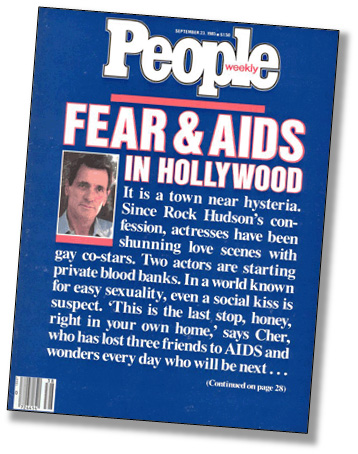On Friday afternoon, in an interview with Andrea Mitchell coinciding with Nancy Reagan’s funeral, Mitchell mentioned that Nancy Reagan had led efforts to fight gun violence and fund Alzheimer’s research. Here is the full context of Hillary Clinton’s reply:
When something happens to you, like a good, dear friend James Brady being shot and suffering, your husband having Alzheimer’s, it can’t help but change your perspective, and I wish more people would pay attention to those who have gone through these issues.
The other point that I wanted to make too is, it may be hard for your viewers to remember how difficult it was for people to talk about HIV/AIDS back in the 1980s. And because of both President and Mrs. Reagan — in particular Mrs. Reagan — we started a national conversation when before nobody would talk about it, nobody wanted to do anything about it. And that too is something that I really appreciate with her very effective, low-key advocacy. But it penetrated the public conscience and people began to say, “Hey, we have to do something about this too.”
I wanted to present the full context of her remark so you could see what might have spurred it. Needless to say, it generated a tsunami of criticism, since Ronald Reagan was famously indifferent to AIDS and declined to mention it in a serious way until 1987. Within hours, Clinton offered an apology:
While I respect her advocacy on issues like stem cell & Parkinson’s research, Nancy Reagan was, sadly, no hero in the fight against HIV/AIDS
— Chad Griffin (@ChadHGriffin) March 11, 2016
This whole affair is completely inexplicable. Did Clinton forget about Reagan’s terrible legacy on AIDS? That’s hardly likely. She has a mind like a sponge, and the visceral gay hatred for Reagan’s legacy is very, very well known in the liberal community.
Was she pandering? If so, it’s hard to figure out who she’s pandering to. Certainly not to liberals. And not even to centrists. Nor was she maneuvered into a position where she felt like she had to say something nice specifically about the Reagans and AIDS. She explicitly brought it up on her own.
So what the hell happened? What’s the most sympathetic reading you can construct about this? It would go something like this:
- In its early years, AIDS really didn’t get much attention outside of the medical and gay communities. That started to shift a bit in 1983, mostly leading to hysteria about catching it from toilet seats or handshakes from gay men.
- Ronald Reagan at that time was a conservative in his 70s. It’s not surprising that he felt it was inappropriate for the president of the United States to talk about sexually-transmitted diseases in public. And he did go along with increases in research funding
 for AIDS during this period.
for AIDS during this period. - It’s really true that most people—and nearly all national politicians—had a hard time talking about AIDS during this period. America was nowhere near as gay-friendly in the early 80s as it is now. But there was a sea change in public perceptions in 1985. Ryan White, a charismatic teenager who acquired AIDS via a blood transfusion, was banned from school. Rock Hudson announced that he had AIDS. People magazine published its first cover story about AIDS and Time published only its second (the first was mainly about researchers trying to track down a cure). AIDS became a far more potent issue after these two events.
- Clinton had earlier mentioned that when something happens to a person close to you it often has a galvanizing effect, and that prompted her to think of Rock Hudson, a friend of the Reagans from their Hollywood days. His announcement very clearly affected both of them deeply, and there’s evidence that around this time, Nancy started working behind the scenes to push her husband to take the AIDS epidemic more seriously.
- And all this somehow spurred Clinton to momentarily lose both her historical sense and her political sense and produce the tone-deaf remark she did.
I dunno. That’s the best I can do, and it’s not very persuasive. Clinton had just mentioned Alzheimer’s and very deliberately brought up AIDS as a distinct example of Nancy Reagan’s kindness. Her comment about AIDS was clear and coherent: it plainly referred to AIDS. It was no mistake. And even if Nancy Reagan was a bit more aroused about AIDS than her husband, it’s very common knowledge that her advocacy was still decidedly modest.
Matt Yglesias suggests that Clinton’s gaffe is “revealing of her insider perspective on social change.” That is, Clinton thinks about these things from the top down, rather than the bottom up, and that prompts her to give more credit than she should to actors like the Reagans instead of to the activists who deserve it. I suppose that might be the answer—though Clinton, both by background and experience, sure seems pretty plugged into the power of grass-roots activism.
So it’s a mystery. I can’t imagine why Clinton said something so dumb and inflammatory, and I can’t imagine she was pandering to anyone. What the hell caused her to momentarily lose her senses over this?














